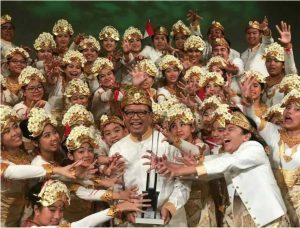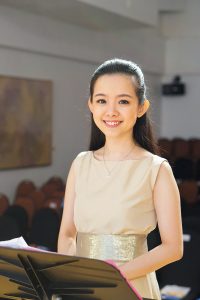Agastya Rama Listya
choral conductor and composer
Prologue
The Resonanz Children’s Choir (TRCC) is one of very few children’s choirs in Indonesia that has been able to excel in world-class choir competitions. One of its greatest achievements was to capture the title of Grand Champion at the European Grand Prix for Choral Singing held in Maribor, Slovenia, in 2018.

TRCC was actually established in 2007 for a practical reason—to provide a choir for an event in Jakarta. Avip Priatna, leader of the Batavia Madrigal Singers, then decided to establish this children’s choir. Since 2012, he has transformed it into a genuine choir, winning victory after victory both at home and abroad.
Besides examining the achievements of TRCC, this paper aims to explore the choir culture built by TRCC during the last 13 years, which has allowed it to grow into a Children’s Choir (PSA) to be reckoned with around the world. Information was obtained by interviewing its founders, namely Avip Priatna; Devi Fransisca, former TRCC coach, who currently lives in Germany; and Luciana Dharmadi Oendoen, TRCC coach from 2013 until the present time.
Coaching
TRCC membership has a fairly wide range of ages; the youngest is 4 years old and the oldest 16. To maintain a successful regeneration process, membership is divided into three age groups: 1) Serunai (4-7 years), 2) Seruling (8-11 years), and 3) Tifa (12-16 years). Serunai practises on a different day and with a different coach than the Seruling and Tifa groups.

One of the biggest challenges instructors face in working with a choir made up of such a wide range of ages is matching the technique and character of the voices. This is not surprising, considering the difference in voice maturity of each age group. According to Devi Fransisca (Devi) and Luciana Dharmadi (Lucy), this means that instructors must have a clearly thought-out training concept and the ability to communicate their ideas to all of the singers, verbally and visually as well as musically. The hope is that each singer will acquire the same perception of what the instructor wants. Devi and Lucy agree that children are good imitators. Therefore, information and instructions given by the coach are easily recorded in their memories. Furthermore, Devi explains that the ability to choose vocabulary that is understood by all of the members and a sense of humor are essential for a children’s choir instructor. Other requirements include having strong discipline, being fair to all members, and being inspirational and visionary.
The second challenge instructors face is deciding upon a repertoire appropriate for the children’s age bracket. They must not only choose a repertoire that the choir is able to perform but be able to explore technical abilities and, at the same time, reveal each member’s musical experience. Therefore, according to Avip, the selected repertoire is not based on the time period or genre of the music.
The next challenge instructors face is limited rehearsal time. Practically speaking, TRCC rehearses only once a week, on Saturdays from 13:30 to 16:00 WIB. With such a relatively short time for practising, Avip explains, instructors are forced to use the time available as effectively and efficiently as possible. The rehearsal portion covers not only technical matters related to singing ability, song mastery, and listening skills, but also instils discipline, hard work, responsibility, and sensitivity to the surrounding social environment. The instructors agree that hard work, discipline, and the ability to work together as a team will shape each singer into a successful individual, both academically and socially.
Lucy observed this as well. She noticed that discipline, a spirit of hard work, responsibility, and concern for the surrounding environment instilled by the learning process at TRCC had spread among the members and also to their parents. There was a strong desire among members and their parents to continue developing in a positive way.
Other Important Factors Behind the Success of TRCC
Building a pleasant training atmosphere turned out to be one of the determining factors of TRCC’s success. Devi said that her relationship with members could be likened to the relation between younger and older siblings. The absence of a barrier between the instructor and the members enabled them all to express themselves freely. The attention members paid to their instructors also left a lasting impression, especially for Devi. From small matters like these, TRCC was transformed from a choral group into a comfortable ‘home’ for each of its members. Concern for one another as a family was also visible in the form of financial support (cross subsidies) for those members who were having difficulty, for example in paying to participate in a competition.
Another very important factor is parental support for programs designed by the TRCC management. For example, it has involved parents as representatives in discussing programs related to concerts and TRCC involvement in competitions, including their financing. Involving parents in the planning and implementation of activities has helped instructors concentrate solely on technical matters.
When the COVID-19 Pandemic Struck
The pandemic that has now spread throughout the world has had a direct impact upon singing activities, particularly upon choirs. Singing in choirs, which is usually an enjoyable endeavour, popular around the world, was suddenly alleged to be one of the principal activities with the potential for spreading the COVID-19 virus. As a result, choral activities were immediately stopped, including concerts and competitions. This was experienced by TRCC as well.

TRCC stopped all off-line training at the beginning of the year and decided to continue rehearsals online starting in June 2020. Of course, it is not easy for the instructors or the members to practise online. One of the biggest challenges faced in studying online is finding learning methods that are suitable and efficient in a relatively short time. There are also issues, such as unstable Internet connections, that develop into annoying problems. Lucy complains that one of the drawbacks of training online is that it is difficult to create the feeling of an ensemble because practising is done individually. Nevertheless, the advantages of rehearsing this way are the increased independence and responsibility of each individual.
Even though TRCC continues to maintain its existence through virtual choir concert activities, when asked further about her views on a virtual choir competition, Lucy responded that she is still unable to accept the idea. Both Lucy and the TRCC management question the objectivity of evaluation in a virtual choir competition, considering the important role played by audio and video editors in producing an excellent recording. This is no surprise, given that a virtual choir competition itself is a new phenomenon that emerged in the midst of the pandemic. Because of that, competing as virtual choirs is still a controversial issue among choir groups.
Conclusion
Despite the problems and challenges faced by the instructors in working with TRCC, Avip, Lucy, and Devi agree that they are actually enjoying a very valuable experience. For example, Avip feels that directing TRCC is a unique ‘privilege’ that cannot be obtained elsewhere. It is considered so because of: 1) the vigorous energy of each member, 2) the high quality of the music, 3) the unyielding spirit in tackling difficult repertoires, and 4) the extraordinary parental support.
For Lucy, TRCC is a unique, serious, and, at the same time, diverse institution. TRCC feels unique because each member is encouraged not only to become a good musician but also to possess a spirit of leadership and a critical attitude toward existing conditions. The sincerity of TRCC is clearly seen in the guidance process and program of activities, which include music camps, music workshops, concerts, competitions, and festivals. At the same time, the educational, social, ethnic, and religious backgrounds of the members make TRCC extremely diverse.
Devi feels that this valuable experience is, in fact, obtained beyond the rehearsal sessions. She enjoys the times when she is communicating with members, when they open their hearts to her, or when she receives small surprises from them to celebrate her birthday. For Devi, TRCC is so impressive because all of the children belonging to it are fortunate. They are blessed to be in an environment where many people truly care about them and their dreams.

In closing, the writer concludes that the success of TRCC does not depend solely upon technical and artistic aspects such as technical skills, musical ability, and choral artistry but is also greatly influenced by non-technical factors. Valuing the importance of building close relationships between each member and instructors, as well as recognizing the choir as a medium for building responsibility, discipline, concern, leadership, and a critical attitude, are examples of these factors. Then too, the full support of parents is another factor that should not be forgotten. By combining these elements, TRCC has created a choir culture that makes this choral group unique as well as cohesive in comparison to other children’s choirs.
Agastya Rama Listya obtained a Bachelor of Arts in Music Composition from the Indonesian Institute of the Arts Yogyakarta in 1992. His master’s degree in choral conducting was received from Luther Seminary and St. Olaf College, Minnesota, in the USA in 2001. In 2018, Agastya completed his PhD in Ethnomusicology at Otago University in New Zealand. His interests include composing and arranging music, choral conducting, and music research. Currently, Agastya is the artistic director of Lux Aeterna Vocal Ensemble (2015-present) and the head of Satya Wacana Music Department in Salatiga, Indonesia. Email: agastya123@gmail.com
Edited by Richard Kutner, USA


